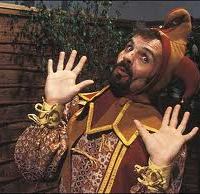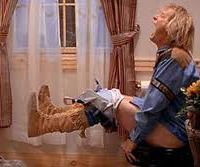Trainspotting (1996) – The Zeitgeist has Crash-landed…
 So it must have been around ’96 or something, because England were doing alright in the football, and it was the last time I can remember when everyone in the country didn’t hate each other’s fucking guts.
So it must have been around ’96 or something, because England were doing alright in the football, and it was the last time I can remember when everyone in the country didn’t hate each other’s fucking guts.
We were all driving along on this big double decker bus painted with the Union Jack. Liam and Noel were there, wearing their little round shades, and they were like, “Is it worth the aggravation to find yourself a job when there’s nothing worth working for?”, and we all agreed it wasn’t, because all we needed was cigarettes and alcohol.
Jarvis was there too, in his felt jacket, and we were singing along with the common people, singing along because it might just get us through; Damon was up on the top deck talking to Tony – you could tell they didn’t think much of that Northern lot. Even Keith from The Prodigy was there, doing his mad dance where he jumped around and slapped his head a lot – you had to stand back a bit if you didn’t want your pint spilled when he was about.
Then I don’t really know what happened after all that, I think the bus went off the road and tipped over in a ditch somewhere, and I must have been in a coma for a bit, because when I woke up half a generation had gone by. Everyone was in their Thirties all of a sudden, and quite some time must have passed, because nothing seems as nostalgic as a fuzzy guitar riff on an Oasis track on a summer’s afternoon, something to take you right back to when you were young and jobless and didn’t give a shit.
Then there was Trainspotting – the good ship Britain was riding high on the crest of a wave, Oasis were having tea at Number 10 with Tony and his mates, and from north of the border came our answer to Pulp Fiction. (If it was crap, it would have been Scotland’s answer to Pulp Fiction…)
If I’m fair, Trainspotting was probably the film that really got me into movies – the hype was enormous leading up to it’s release, especially after the sleeper success of Danny Boyle’s debut, Shallow Grave, and the shit hot buzz surrounding Irvine Welsh’s novel. The first movie magazine I ever bought was the Trainspotting edition of Empire, and it kind of went from there.
 Britain’s answer to Pulp Fiction – choose Miramax, choose a teaser trailer, choose a catchy ad campaign, choose a must-have soundtrack album, choose quotable dialogue, choose posters for every teenager in the country’s bedroom wall…apart from those things, Trainspotting didn’t have too much in common with Tarantino’s second feature, and has dated badly in comparison.
Britain’s answer to Pulp Fiction – choose Miramax, choose a teaser trailer, choose a catchy ad campaign, choose a must-have soundtrack album, choose quotable dialogue, choose posters for every teenager in the country’s bedroom wall…apart from those things, Trainspotting didn’t have too much in common with Tarantino’s second feature, and has dated badly in comparison.
While Pulp Fiction was set in an unspecified netherworld of hipster hitmen in suits, surreal situations and esoteric tunes on the soundtrack – in other words, set inside Quentin Tarantino’s head, Trainspotting was very specifically of it’s own time and place, and I couldn’t help the nagging sensation it was dated by the time it was released. Fifteen years on, certain scenes look about as cool and edgy as a re-run of Rab C Nesbitt. (Yes, yes, I know Rab was Glaswegian, but you get my point…)
Trainspotting opens with a burst of unadulterated energy as Mark Renton (Ewan McGregor) and his so-called mates leg it along Edinburgh’s Princes Street from the police, to the restless rat-a-tat of Iggy Pop’s Lust for Life. The track became synonymous with the film, and was vital in giving it it’s feeling of urgency – a feeling that it sporadically flirts with throughout the rest of the running time, but never fully recaptures.
Like many so-called “unfilmable” novels, there is very little plot and suffers from an episodic nature, heavy on voice over and low on actual dramatic situations. I believe there is no such thing as an unfilmable novel; it’s just a matter of how you approach it. There is plenty of drama in Welsh’s novel, most of it seething off the page in the scalding dialogue. If anything, screenwriter John Hodge has been too faithful to the novel, as if scared to veer too far away from it’s chief asset, that vitriolic narrative voice – as a result, big chunks end up piled on top of the images as a voice over.
Because of this, the characters suffer – there are very few scenes of any real length, or scenes where the characters actually converse with each other. Like the iconic orange and black poster campaign, the characters are isolated figments, restricted and constrained by the bite sized anecdotes they appear in, with no room to grow.
The only character that really develops is McGregor’s Renton, and that’s partly because McGregor is a magnificent actor, and partly because you can’t actually get away from Renton in Trainspotting – not only is he the main character, he’s also the narrator, and has a certain omniscience, even offering a spot of V.O on other character’s stories.
Sick Boy (Johnny Lee Miller) looks cool alright, but basically spends the whole film talking about Sean Connery – there is nothing to touch upon his selfish, bitter soul like the novel; Begbie (Robert Carlyle) has a few moments, but is more of a cartoonish presence than the malevolent, psychotic wifebeater of the book. Diane (Kelly McDonald) matches Renton for smarts as his jailbait girlfriend, although is limited to a few small scenes, and sympathetic Spud (Ewan Bremner) is basically in it to provide some incomprehensibly motormouthed comic relief, and also prick Renton’s conscience.
 Trainspotting begins at a sprint, then runs out of puff pretty quickly, and Boyle occasionally tries to inject some energy with some flashy scenes, with mixed results. Most notable is a sequence where Renton loses his heroin suppositories down a filthy toilet in a bookies. In the book, it is a squalid, pathetic scene as he rummages desperately through other people’s piss and shit to get them back; Boyle turns it into a fantasy sequence where he disappears head first down the toilet, swims along to some nice music, and re-emerges with his bum bullets. It looks cool, but loses all its impact.
Trainspotting begins at a sprint, then runs out of puff pretty quickly, and Boyle occasionally tries to inject some energy with some flashy scenes, with mixed results. Most notable is a sequence where Renton loses his heroin suppositories down a filthy toilet in a bookies. In the book, it is a squalid, pathetic scene as he rummages desperately through other people’s piss and shit to get them back; Boyle turns it into a fantasy sequence where he disappears head first down the toilet, swims along to some nice music, and re-emerges with his bum bullets. It looks cool, but loses all its impact.
Shorn of the detailed dialogue and characterization of Welsh’s novel, it pretty much boils down to drugs are brilliant, then you get addicted, then drugs are bad. Thanks!
1996 and all that – Cool Britannia, crest of the wave, a curious mix of fatalism and optimism. Is it worth the aggravation to find yourself a job, Oasis asked, when there’s nothing worth working for, while taking tea with Tony at Number 10. England were doing well in the football, but what caught the spirit of the Nation during Euro ’96 was Three Lions, a song about how bitter and disappointing it was to be an England fan. Trainspotting, our answer to Pulp Fiction, pretended to be the most nihilistic of the lot – Choose Life, it ironically said – but turned out to be the most vaporous and intangible of them all.
Posted on 01/12/2011, in Drama, Film, Movies, Reviews, T and tagged Danny Boyle Trainspotting 1996, Ewan McGregor Trainspotting 1996, Irvine Welsh Trainspotting Adaptation, Trainspotting 1996 Cool Britannia, Trainspotting 1996 Movie Review. Bookmark the permalink. 2 Comments.







I actually really like this film (even though it isn’t exactly the best advert for my home city!), but i enjoyed your article nonetheless. I do think Boyle’s style gets in the way of a few of his films (127 hours) but it worked for me in this one.
Thanks, I’m glad you liked the article even though you didn’t necessarily agree with it – I watched it again the other day, and just wanted to try putting it in some kind of context, because it makes me feel nostalgic! All the best, Lee